Unforgettable Memories: Mordialloc Meals on Wheels
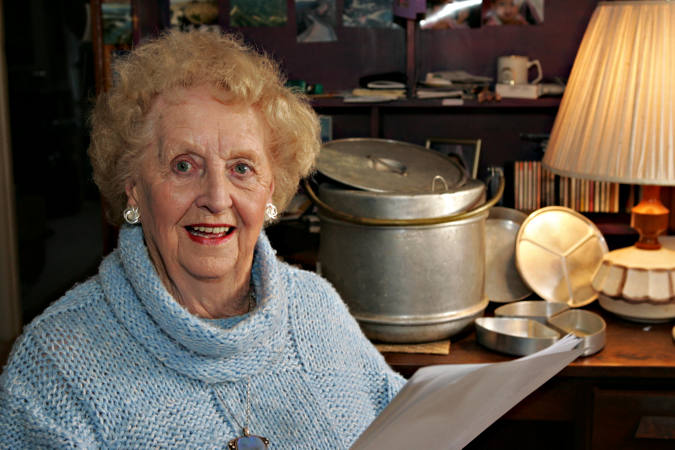
Vera Phillips with some of the original pots used in the early days of the Meals on Wheels service.
When appointed as supervisor to plan, commence and operate the Meals on Wheels service in the City of Mordialloc, Victoria, I accepted the positions for two reasons. Number one, I had always been concerned about the problems affecting the elderly. Secondly, I believe completely in the goodness and the worth of every volunteer, no matter what he or she does.
For several weeks I visited the Meals on Wheels services already in existence, and was very interested to visit the South Melbourne Depot where the original meals started in South Melbourne on June 24, 1953. Mary Keogh delivered some meals from a box which was attached to a two wheel bicycle. By 1997 five million meals were being delivered per annum in Victoria. [Royal Auto, July 1997]
I made copious notes about what I thought was working perfectly and perhaps what might be changed. All the information gathered by me in those first few weeks was then sifted and sorted out by me where I was working in a small room allotted to me in the Council Chambers.
As the days went by there was considerable pressure mounting from more than one source as to when the Meals on Wheels would start. How much longer did I need? So one particular day feeling rather frustrated I said to the Town Clerk the Meals on Wheels service can start on Monday July 26. This still remains one of the biggest mistakes I ever made in my life. I should have said – the venue is ready, the food is ready, the roster is ready but where am I going to work?
The Mordialloc Benevolent Society had presented a report to the council showing the great need of the Meals on Wheels service within the city and it has been proven so ever since, so it seems that some attention should have been given to providing an office for the Supervisor to operate from. The Meals on Wheels service was to operate from the Allan McLean Hall, Albert Street, Mordialloc, in the kitchen. I started the Meals operation on the counter in the cloak room on the other sided of the hall using the telephone belonging to the caretaker, sitting on a three legged stool which I brought from my own kitchen. During this period there was no phone call or official visit to enquire what was needed to ensure the smooth running of the service. It is said that the squeaky wheel gets the most grease, but I was so busy keeping the service working that I had little time to squeak.
When the hall was booked for a function the caretaker would polish the dance floor leaving a strip a metre wide between the cloak room and the kitchen for me to cross over safely. On one occasion when he was absent, the relieving caretaker did not know of the ploy and the whole floor was polished and as I rushed across to the kitchen I slipped and fell very heavily on my right hip. Thankfully apart from severe shaking and much bruising no permanent damage was done.
I spent some days with the Chief Executive Officer at the Kingston Centre from where the meals were cooked and transferred to the Allan Mclean Hall. I still remember how amazed I was on my first day there, at the quality of the vegetables as they were coming down the chute. Cauliflowers, green beans, potatoes, carrots with not a single blemish on them. The food was always of the highest quality. All serving equipment was chosen and supplied by the Chief Executive Officer. From the very first day he impressed on me emphatically the importance of the meals being served well presented and he said it was no good them serving the good food if it was presented in a slipshod fashion as this could have a negative effect on the recipient’s appetite.
The Chief Executive Officer went on to become a true and valued friend. For the first six months he made frequent visits over to the kitchen to see if everything was running smoothly and if I needed any help. He was always available to talk to me on the phone to deal with any problem whatsoever. After we had been operating for about six weeks, I rang and told him that was I receiving some complaints that there were too many carrots.
He replied, “Well you will have to learn to live with that Mrs Phillips because carrots will be served nearly every day, as it is the most nutritious vegetable of all for the aged.” However, they were always served differently – fine slices, carrot cubes, carrots julienne, carrots and parsnip sticks served together. Strangely the complaints then ceased all together.
The meals would be transported in large steel cylinders in a food transport vehicle, then loaded into a heated bain-marie at the Allan McLean Hall. The meals would then be served into round containers containing three triangles, one for the meat and gravy, one for vegetables and one for the dessert. They would then be lidded and placed into a very large hot oven, which had to remain at the same temperature always, even in the hot weather. After one hour, the meals were taken out, placed in frames of five, and loaded into very large stainless steel buckets which had been preheated with boiling water.
The mayor of the day, Cr Stan Hawken, invited interested citizens to afternoon tea at the Allan McLean Hall to explain the future service of the Meals on Wheels and there was an attendance of one hundred and ninety six.
After I had spoken to those present about the operation and what was needed, they formed two queues one to the mayor and one to myself, and we took names, telephone numbers, addresses, what they wanted to do and how often they wanted to do it. These details formed the basis from which the roster were created
The Meals on Wheels Service started on July 26, 1971 when nineteen meals were served costing forty cents per meal. The list of volunteers was broken into three categories – number one the servers, number two drivers, and number three the washing up team.
As much as possible I tried to personally choose a server. I needed to note a clean and tidy appearance, a cheerful disposition and the possibility of being able to work very closely with team members. The servers worked on the same day of the week, week in and week out, Summer, Autumn, Winter, Spring.
A strong bond of friendship appeared to have been formed between all five teams and when one server had to drop out because of illness or a family emergency, a server from another day was always willing to step in and take her place. For this I was very grateful because it would have been difficult to have pulled somebody off the roster list and expected them to have performed the serving duties at short notice. Whilst I recognise and acknowledge the worth of every volunteer who helped the Meals on Wheels Service, nevertheless great tribute must be paid to the servers. It would be impossible to calculate how many hours of volunteer service the serving teams gave year in year out with such loyalty and excellence.
They came on duty about half past nine, first of all filling the stainless steel buckets with boiling water; when the meals arrived they were then served into the containers and then placed in the hot over for one hour. Approximately 11.00 a.m. the buckets were emptied and dried, then the meals were taken out of the oven, placed in frames of five and inserted into the stainless steel buckets and then arranged according to the routes with the number on the bucket. The stainless steel buckets were extremely heavy to lift and carry. However, ever day they were handled by each and every volunteer, no matter what their task was, whether it was serving, driving, delivering or washing up.
The drivers and the jockeys would arrive at approximately 11.15 to 12 noon. They would receive their delivery list/instructions which were divided into three columns. The name of the recipient, the address and in the third column explicit instructions for the delivery of the meal, for example, front door, back door, side door, knock three times, or call out. The delivery lists were always planned so that the driver was going to go from A to B to C to D in the most direct route.
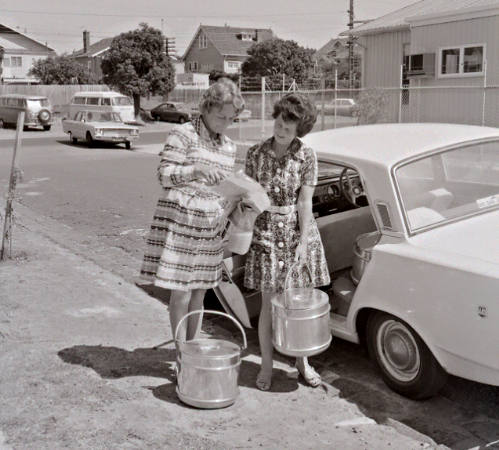
Two members of the Mordialloc Team with stainless steel buckets 1974. Courtesy Leader Collection.
Washing up volunteers arrived about 12 noon. Every piece of equipment used for Meals on Wheels including all serving utensils, the bain-marie, all containers for the meals, and the large stainless steel buckets had to be washed in hot water, using a special detergent, rinsed thoroughly in cold water and dried.
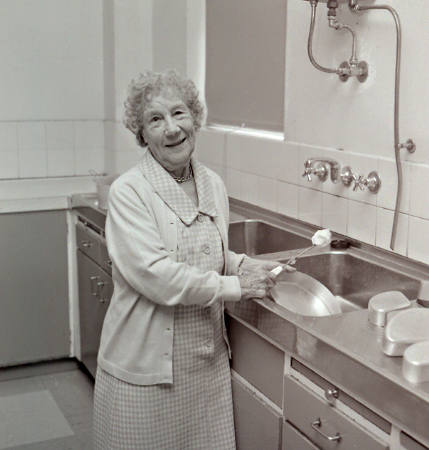
May Hewitt a washing up volunteer at 92 years of age at Mordialloc, 1973. Courtesy Leader Collection.
For every twenty meals served, there would be a total of one hundred and thirty articles to be prepared for the next day’s operation. The work and loyalty of the washing-up teams was invaluable to the Meals on Wheels Service.
If a new applicant for the service seemed to be suitable to go onto route 2, that would mean transferring somebody from route 2 to route 3, or perhaps 3 to 4 or 5 to 1. All the route instructions were written by hand, and in some circumstances it required a sustained effort to complete them ready for the next day. The weekly fee for the Meals on Wheels was collected on a Monday by the volunteers. The opening number of 19 meals quickly grew to 70, to 80 to 90 and eventually it was 102 or 111. The huge steel buckets held five meals each but there never seemed to be any car that could take more than four buckets at a time.
That’s a total of twenty meals. So five routes serving twenty meals per route was 100. The extra meals over that 100 were served, on the advice of the Kingston Chief Executive Officer, wrapped securely in two large sets of newspaper, and delivered to the applicants nearest to the Meals on Wheels kitchen, and it seemed to work because I did not receive any complaints.
As time went by the council issued the drivers with a large sticker for display on the car which volunteers found to be a considerable help when they were parking. Later each driver was issued with a petrol allowance.
With the number of applicants steadily growing the council agreed to appoint an Assistant Supervisor. The first one to start was Pat Crowe, who gave me valuable assistance working out the rostered duties. The longest serving Assistant Supervisor was Elsie Medson whose gentle manner, tact and understanding endeared her to all the volunteers. Until the arrival of an assistant supervisor there was no actual lunch break for the Supervisor, because the phone had to attended and answered at all times in case there was an emergency with a recipient or a volunteer.
Vera Sambell, wife of Councillor Cliff Sambell, also a former mayor, was a member of the washing up team. She went home after her day of duty and said to Cliff, “It won’t be long before we will be getting a new supervisor.” Cliff replied, “Why would we be doing that? Vera’s doing a splendid job.” And Vera said “Well she is going to drop dead in the middle of the hall.” This conversation took place in the middle of an oppressive heat wave after we had been operating for about five months. Cliff turned up at the Meal’s kitchen the next morning and I welcomed him and he said, “Oh I have just come down to see how you are getting on.”
Well the gremlins must have been on my side that day because I received eleven calls in fifty minutes which meant I was crossing and recrossing the hall hurriedly. Two days later Telecom arrive and installed an extra new plug in the kitchen which meant that I could bring the phone over to the kitchen and plug it in and take any calls there without going backwards and forward to the office. I was not aware of this incident for several months, until Cliff informed me that he was so surprised at the way Vera spoke he thought he had better come down and find out what was going on.
I was always grateful to Cliff and Vera for their most needed help and support. I was always grateful to Councillors Fred Finn, Cliff Sambell and Deryk Person, who courteously listened to my side of the story when a contentious issue was being debated in council.
When I resigned, I was using a pool of three hundred and ninety three volunteers, plus the students from the four secondary colleges – Mentone Girls’ Grammar, Mentone Girls’ Secondary College, Kilbreda and St Bede’s College who worked in pairs on Tuesdays, Wednesdays and Thursdays. It would have been impossible to have kept the roster running smoothly without the continuous help of these students. Never once did I ever receive any complaint concerning a young person. On the contrary, from time to time I would receive a very pleasant phone call from a recipient saying, “Mrs Phillips, it was delightful to speak to those young people today,” and “Mrs Phillips how courteous those young people were today and so helpful to me.”
Phone calls were numerous. On one occasion, two St Bede’s students asked if they could visit Mr X, on Sunday afternoon and play chess with him. I rang Mr X and he was delighted. For many months those kind, unselfish boys gave great happiness and friendship to a lonely old man.
There were only ever two resignations from the Service – both giving the reason for resigning above and beyond my control. There were only three difficult volunteers – two females and one male. A large asterisk was placed opposite their names in the roster book, so that when I was absent, the Assistant Supervisor would know to handle them with kid gloves. I was asked why on earth did you do that - simply, because every volunteer was valuable, every volunteer was important to the service, and if it meant using a little bit of soft soap, so be it.
Maintaining the roster took up a great amount of time and effort and it was especially difficult when there was a petrol strike, or a train strike, more so if that was called after I had left the office and returned home. I would come in early the next morning to chaos. In the flu epidemic of the late 70s the roster was fractured to shreds.
On two occasions the Assistant Supervisor and I did the whole of the washing up together, just the two of us. On one occasion she brought her car and took out a whole route on her own, which was of much concern to me and I certainly would not have been able to ask any volunteer to do that. In May 1975 there was a snap hospital workers’ strike. I was given no notice, but alerted to the situation at 3.50 p.m. by a volunteer who had heard the news on the radio. What on earth could I do about one hundred elderly people needing their meal next day? I did a rapid phone-a-thon and once again the volunteers rallied to the cause and next morning twelve ladies turned up armed with their own fry pans and pressure cookers, and fresh vegetables and food. They prepared and cooked a meal of orange juice, sausages and tomato, gravy, silver beet, carrot straws, mashed potato and fruit salad and custard. The meals were then packed and served on time for the needy recipients. Fortunately that was the only time such an incident took place.
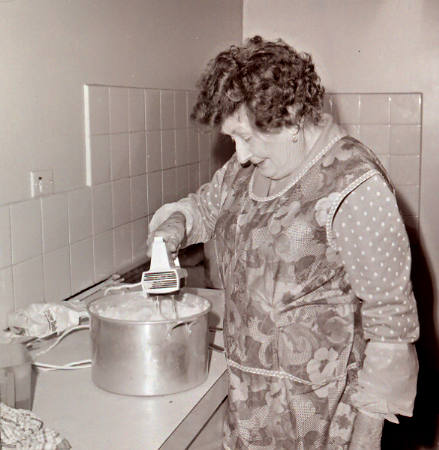
Vera Sambell preparing mashed potatoes during the hospital strike of 1975. Courtesy Leader Collection.
On one particular day, I had exhausted all my avenues of supply and I still needed two jockeys. The Salvation Army had a depot two streets away from the hall where young people could come and play snooker, and darts and cards and have a cup of coffee, while they were unemployed. I rang the Commissioner who had also been one of my drivers, and explained my desperate situation and asked if there might be two young people there who would be willing to help. He came back on the line and said “Yes, Mrs Phillips, Mike and Bill will be around in about five minutes.” There was a knock at the door and I opened it and in came Mike and Bill. And I literally gasped. Mike was a tall thin young lad with a Mohawk hairdo and four earrings in one ear. Bill was a little short chap, and he had his hair divided down the middle, and it was red on one side and purple on the other. He also had earrings and they were both chewing frantically.
I thought what will happened today when they walk in on some of the elderly. But I had no choice, so I introduced myself and explained as they would be handling food they would have to get rid of the gum and they both went outside and disposed of it.
Their drivers arrived, I introduced them explained more about their duties and so they departed. I sat by the phone waiting. After about 10 minutes the first phone call, a man, “My word, Mrs Phillips, you pulled the rabbit out of the hat today. What a charming young man. So helpful.” The second phone call, a lady , “Mrs Phillips, Wherever did you find that charming young man today? He was so courteous, the way he spoke to me.” All together I received a total of five calls.
Bill, the shorter one, came back first from his route, and it had all gone smoothly. He asked could sit and wait for his mate until he returned. After about three minutes he was watching the ladies doing the washing-up and so he jumped up, went and said “Do you need any help?” He proceeded to wipe, put away, and stack all the containers for the ladies, for which they were quite grateful. When his mate came back, he likewise had a trouble free route, and they said goodbye. Almost immediately Bill came back and said, “Mrs Phillips I’m out of work at the moment and I’m not doing anything, do you need any more help?” I gratefully accepted his offer, and he following week he went out three times.
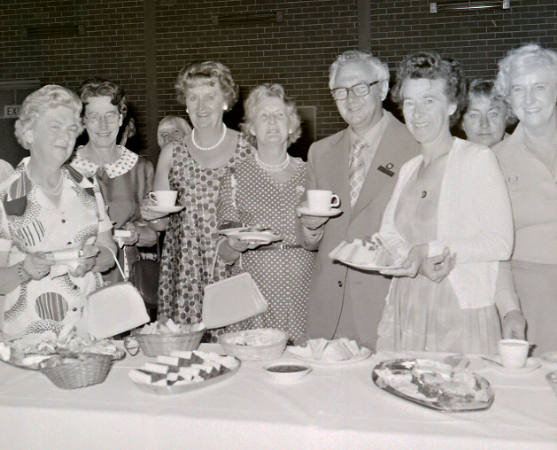
Meals on Wheels Volunteers entertaining the Mayor and Mayoress of Mordialloc (Cr and Mrs Jack Davidson) at afternoon tea, 1977. Courtesy Leader Collection.
Footnotes
- Rankin, Veronica, Unforgettable Memories, 2005.
